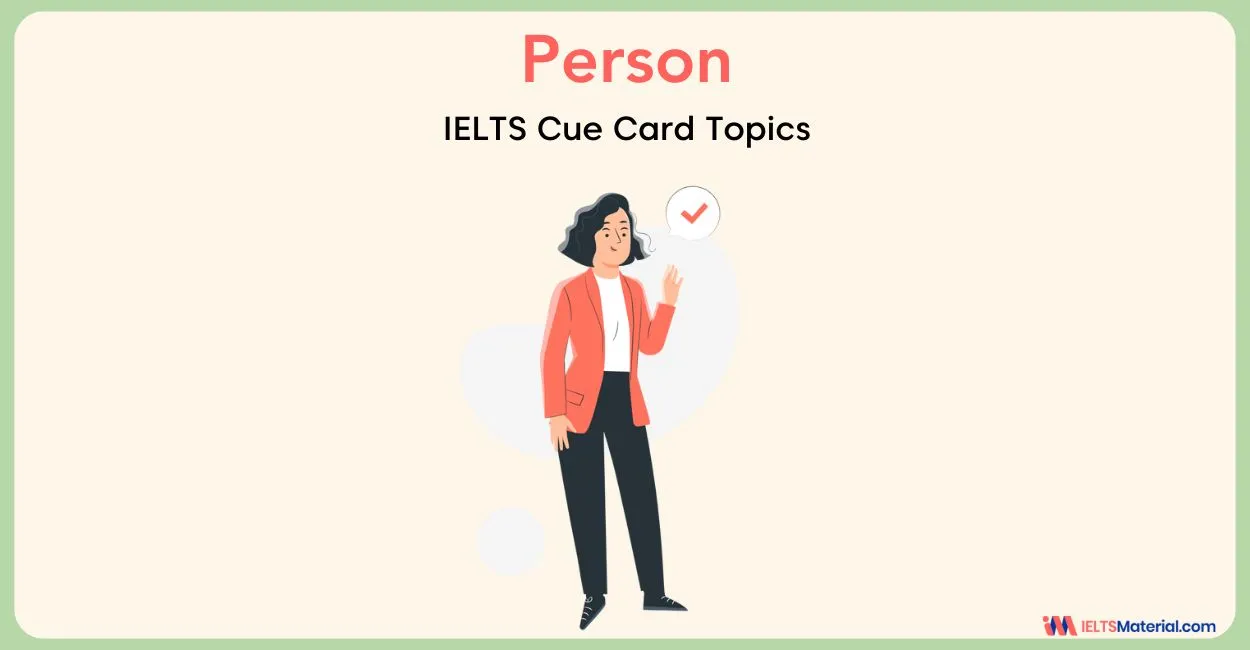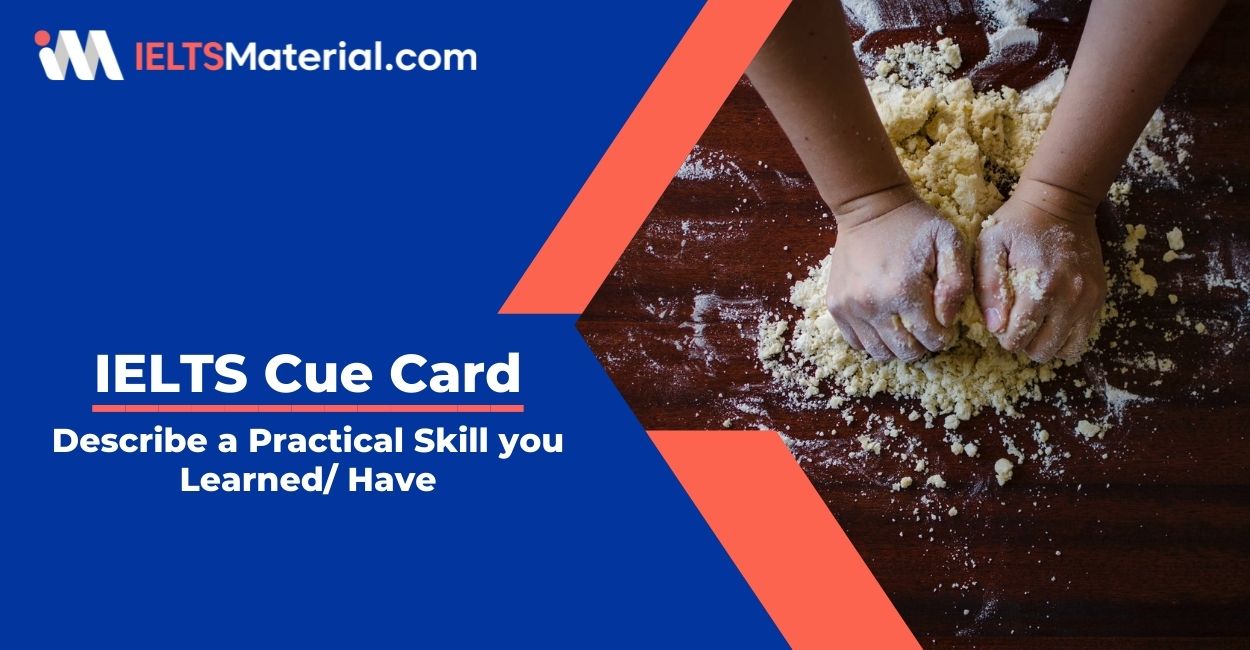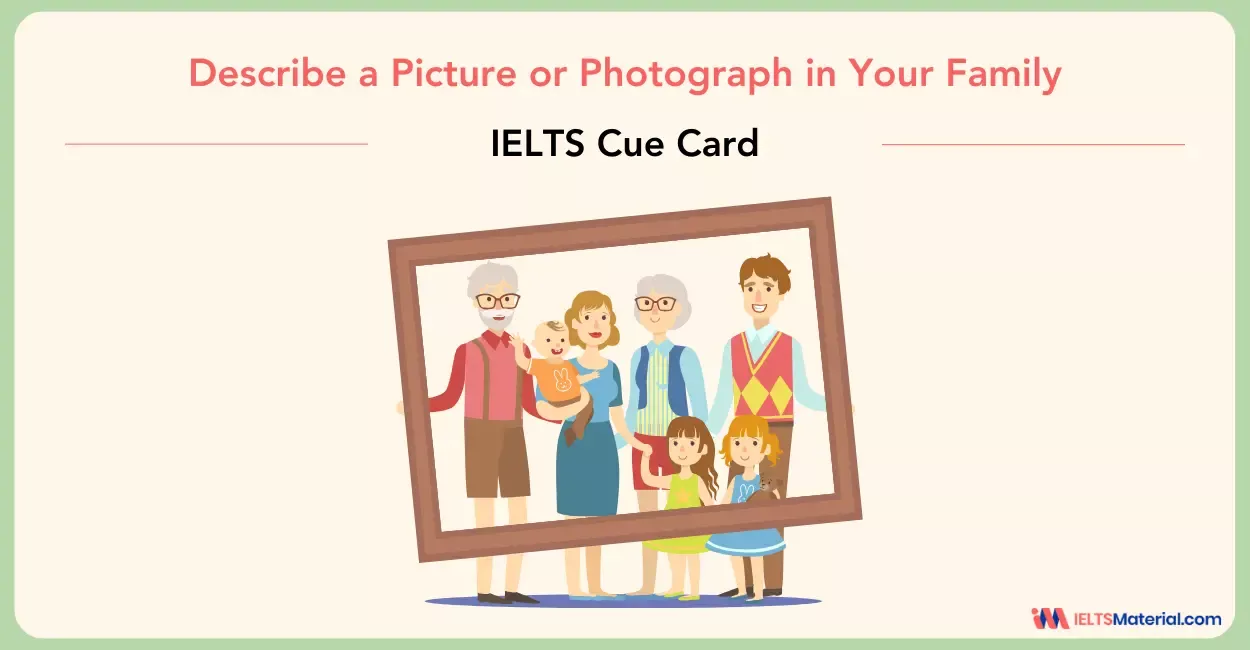Describe a Practical Skill you Learned Have- IELTS Cue Card
6 min read
Updated On
-
Copy link
Table of Contents

Limited-Time Offer : Access a FREE 10-Day IELTS Study Plan!
Describe a practical skill you learned/ have
You should say:
- what this skill was
- when you learned it
- how you learned it
- And explain why you think it was important?
Sample Answer 1
Introduction
Possessing some kind of skills in today’s evolving world is highly beneficial and critical as it helps an individual gain a new knowledge-based perspective on the world around them.
What was the skill?
I believe that there’s no end to learning a skill. So, here, I’d like to talk about a skill that I mastered recently.
When did you learn it?
A couple of weeks back, I visited my grandparents in my home town to rejuvenate myself from the hectic work life. My hometown is a remote village where people enjoy a laid-back lifestyle, including my grandparents. Despite participating in all of the enjoyable things, from riding a cart to jumping into a pond, I felt monotonous and bored. But one day, my interest piqued when I saw my grandmother engrossed in the ritual of chopping and sauteing some fresh mushrooms. As a result, I urged her to teach me cooking skills.
How did you learn it?
I accompanied her to the kitchenette every day to learn the fundamentals of cooking. I was enamoured of her culinary prowess. She taught me all I know about cooking, from peeling to slicing to stirring and presenting the food. In addition, my grandmother educated me on the subject of cuisine. After that, I felt how cooking at home is an oh-so-very adult skill that makes life easier.
And explain why you think it was important?
Initially, I believed that cooking was a dreadful chore that should be learned only after a particular age (adulthood), but after learning to cook, I am convinced that everyone can acquire culinary skills at any age, depending on their love and passion for cooking. Consequently, I believe that cooking is one of the most important skills that everyone should master in their life because it allows them to eat healthier, helps avoid relying on others for food preparation, saves money, and relieves stress. Now that I’ve learned to cook, I can confidently state that it’s an underrated skill that’s both rewarding and enjoyable because preparing my own meals gives me a sense of accomplishment.
Sample Answer 2
Introduction
In today’s competitive and rapidly changing environment, possessing the requisite set of life skills is crucial to meeting the demands of daily living.
What this skill was?
Learning new skills provides enviable fulfillment in our lives, and I believe that learning is a lifetime process with no end or limit. Here, I’d like to talk about a practical skill I learned.
When you learned it?
I’ve always had a sweet tooth since my childhood, which is why I’ve always been inclined to bake. I used to bake cupcakes and apple pie to satisfy my cravings. However, as an amateur baker, I made numerous blunders that resulted in the cake or the crust being burnt. Being quarantined at home and unable to go owing to the pandemic’s curfew, I decided that improving my baking skills was the best option.
How you learned it?
Since I had lots of time on my hands, I enrolled in an online baking class and signed up for a 5-week course, which included basic to advanced training in baking, icing, filling, and fondants. The sessions were held live on Zoom (an online application) for two hours each day, and I even had the opportunity to interact with one of the city’s best bakers.
And explain why you think it was important?
The most important reason I wanted to learn baking skills was that I could become proficient at it. With the pandemic being hard on humans, it wasn’t easy to cope with daily life; however, learning to enhance my baking skills occupied my mind and helped me focus on the positive. Apart from that, it was essential for me to learn and acquire baking skills because I wouldn’t have been able to discover my passion for baking and becoming a home baker. Thus, improving my baking skills during the quarantine was the best decision I ever made.
Vocabulary
- Regret
Meaning: feel sad, repentant, or disappointed over (something that one has done or failed to do)
Eg: The older man regretted not enjoying his young age.
- Craving
Meaning: a powerful desire for something
Eg: I was craving an Apple pudding.
- Sweet tooth
Meaning: a great liking for sweet-tasting foods
Eg: Jack has a sweet tooth.
- Cope
Meaning: (of a person) deal effectively with something difficult
Eg: Matt couldn’t cope with the loss of his pet.
- Amateur
Meaning: a person who is incompetent or inept at a particular activity
Eg: Despite being an amateur dancer, he won the competition.
Part 3 Follow-up Questions
What age will make it difficult for a person to learn a skill?
Well, I don’t believe there is an appropriate age for humans to learn a specific skill set since I feel that age is just a number and that anyone determined to learn a skill or gain knowledge about something may do so. Furthermore, science has proven that the human brain can continue to learn at any age.
Will the age of 5 or 20 be better?
I believe that learning has no age limit and that age is just a number since everyone, regardless of age, can learn anything (a new skill or a degree) if they are determined and dedicated. However, considering whether it is preferable to learn practical skills from the age of 5 or at the age of 20. Some basic life skills, in my opinion, are best learned throughout childhood. For instance, a 5-year old learning basic mathematics, reading and writing, and understanding the difference between animals and birds is good, whereas a 20-year old can only learn to drive a car or cook only at that age.
Who will you learn a skill from – friends, teachers, or parents?
To be honest, it doesn’t matter who teaches me the skill as long as they are knowledgeable about that particular skill. For example, I recently learnt how to create websites from a coworker.
What is the difference between children learning what they like and learning what they have to learn?
In my opinion, parents or guardians should not compel or pressurize their children to acquire specific skills. They must refrain from pressuring children to learn what they are required to study. Rather, they should allow children to learn what they want based on their interests and preferences. For example, if a 10-year-old child wants to learn to ride a bicycle, parents should encourage them rather than prohibit them from doing so at such a young age.
Do you think boys and girls should learn the same skills?
Absolutely, yes, in today’s rapidly changing environment, equality plays an important role leaving no room for gender difference. As a result, girls and boys, nowadays, learn the same skills such as driving a car, running a business, cooking, baking, doing household chores, managing expenses, etc.
Why do boys tend to have better critical thinking skills?
Well, I doubt that, because from my perspective, both are better at critical thinking; it’s the people’s thoughts that bring differentiation between the genders. Because nowadays, both men and women are capable of running and managing businesses. In a nutshell, men and women are on par with each other in almost every field.
Do you like to learn new skills constantly?
Of course, I’m a philomath who enjoys acquiring new talents and expanding my knowledge so that I don’t fall behind in the development race. I believe that consistently educating and learning new things/ skills will enable me to adapt to the changing environment while also providing me with a plethora of career chances. I recently improved my organizational and interpersonal skills, and now I’d like to work on upgrading my time management and problem-solving skills.
What is the most difficult thing for learning?
The most challenging aspect of learning something new, in my opinion, is losing focus, often known as distraction. If someone wants to learn anything new, they should focus entirely on it and make every effort to learn it. They will have difficulty mastering those skills if distractions divert their attention. If a person wants to learn how to ride a bike, for example, they should concentrate on learning the fundamentals of riding a bike rather than diverting their attention to other factors such as how fast or slow they should ride.
Vocabulary
- Divert
Meaning: draw (the attention) of someone from something
Eg: Students’ attention was diverted due to the loud music.
- Consistently
Meaning: in a way that does not change
Eg: Mike consistently prepared to score high grades in the exam.
- Appropriate
Meaning: suitable or proper in the circumstances
Eg: His answer was not appropriate to the question.
- Enhance
Meaning: intensify, increase, or further improve the quality, value, or extent of
Eg: He pursued a 3month course to enhance his programming skills.
- Refrain
Meaning: stop oneself from doing something
Eg: Mike’s dad refrained him from meeting his notorious friends.

Start Preparing for IELTS: Get Your 10-Day Study Plan Today!
Recent Articles

Haniya Yashfeen

Kasturika Samanta

Nehasri Ravishenbagam





Post your Comments